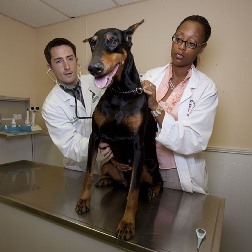How to Enroll In a Veterinary Assistant School in Pennsylvania
 Achieving your long term goal of working with and caring for pets by enrolling in a veterinarian program in Pennsylvania could at first feel like an overwhelming undertaking. After all, you must locate and enroll in a program that will deliver the necessary training so that you can succeed as a veterinary technician, assistant or technologist. But just how do you tackle evaluating and comparing colleges so that you can make the right selection? Many aspiring students start their due diligence process by looking for colleges that are close to their homes. After they have identified some area colleges, they find out which ones have the cheapest tuition and focus on those. Although location and cost are significant factors when evaluating vet tech schools, they are by no means the only critical ones when making your comparisons. Qualifiers such as accreditation and internship programs should be considered also. The point is that there are questions you need to be asking the veterinary tech programs you are evaluating before you make an ultimate selection. We have provided several in this article to help get you started, but before we review them we’ll talk about the various responsibilities of vet assistants and techs and the training alternatives available.
Achieving your long term goal of working with and caring for pets by enrolling in a veterinarian program in Pennsylvania could at first feel like an overwhelming undertaking. After all, you must locate and enroll in a program that will deliver the necessary training so that you can succeed as a veterinary technician, assistant or technologist. But just how do you tackle evaluating and comparing colleges so that you can make the right selection? Many aspiring students start their due diligence process by looking for colleges that are close to their homes. After they have identified some area colleges, they find out which ones have the cheapest tuition and focus on those. Although location and cost are significant factors when evaluating vet tech schools, they are by no means the only critical ones when making your comparisons. Qualifiers such as accreditation and internship programs should be considered also. The point is that there are questions you need to be asking the veterinary tech programs you are evaluating before you make an ultimate selection. We have provided several in this article to help get you started, but before we review them we’ll talk about the various responsibilities of vet assistants and techs and the training alternatives available.
The Job of a Veterinary Assistant and Technician
 One of the initial decisions that you will need to make is whether you want to train as a vet technician, assistant or technologist. Part of your preference may be predicated on the amount of time and money that you have to invest in your education, but the primary determiner will probably be which specialization interests you the most. What vet techs and assistants share in common is that they all work under the immediate supervision of a licensed and practicing veterinarian. And even though there are numerous functions that they can carry out within the Pennsylvania veterinary clinic or hospital, they can’t prescribe medications, diagnose conditions, or conduct surgical procedures. In those areas they may only provide assistance to a licensed vet. There are technicians and technologists that work away from the typical veterinarian practice, for instance for zoos, animal shelters or law enforcement. Let’s take a look at the duties and training prerequisites for each specialty.
One of the initial decisions that you will need to make is whether you want to train as a vet technician, assistant or technologist. Part of your preference may be predicated on the amount of time and money that you have to invest in your education, but the primary determiner will probably be which specialization interests you the most. What vet techs and assistants share in common is that they all work under the immediate supervision of a licensed and practicing veterinarian. And even though there are numerous functions that they can carry out within the Pennsylvania veterinary clinic or hospital, they can’t prescribe medications, diagnose conditions, or conduct surgical procedures. In those areas they may only provide assistance to a licensed vet. There are technicians and technologists that work away from the typical veterinarian practice, for instance for zoos, animal shelters or law enforcement. Let’s take a look at the duties and training prerequisites for each specialty.
- Vet Assistants in almost all instances will have completed a structured training program, either as an intern or apprentice in a practice, or by graduating from a certificate program at a community college or trade school in Pennsylvania. As the name implies, their job function is to assist the veterinarians and vet techs in the execution of their duties. Generally they are not associated with more involved undertakings, for instance assisting with surgical procedures. Some of their typical functions may include working at the front desk, cleaning and preparing exam rooms and equipment, or controlling pets during examinations.
- Vet Technicians undergo more extensive training compared with assistants and typically obtain a two year Associate Degree, ideally from an American Veterinary Medical Association (AVMA) accredited program. They are in a fashion the veterinarian counterparts of medical nurses, since their basic job function is to assist veterinarians with diagnosing and treating animal patients. Where they differ from veterinary assistants is that they are engaged in more complicated duties, for instance assisting with surgical procedures or providing medicine. All states currently mandate that vet techs pass a credentialing exam for either certification, registration or licensing.
- Vet Technologists are comparable to vet technicians and for the most part carry out the same work functions. They are mandated to obtain a Bachelor’s Degree in veterinary technology, which generally takes four years to complete. So the only real difference between a vet technician and a technologist is the technologist’s higher level of education. But with an advanced degree comes more job options, increased salaries and potential management positions. They are additionally mandated to pass a credentialing exam for either certification, registration or licensing.
Veterinary techs and technologists can specialize in areas such as internal medicine, anesthesia or urgent care. Some may earn certification from the American Association for Laboratory Animal Science (AALAS) to work in labs or Pennsylvania research facilities as well.
Online Veterinarian Training Programs
 An option that may be a solution for those with a busy lifestyle or who are working full-time while attending veterinarian school is to enroll in an online training program. Since the classes are made available via the internet, students can attend on their own schedule wherever a computer is accessible. The course of study is taught using various methods, including slide shows, videos and live streaming webinars. And since most veterinary tech and technologist degrees require practical training, that segment can typically be carried out as an internship or work study program at a local Pennsylvania veterinary clinic or hospital. Distance learning, as it is also called, can in many instances lower the cost of your education. Tuition and ancillary expenses, such as for commuting and study supplies, may be more affordable compared to more standard classroom courses. Just confirm that the program that you enroll in is accredited, either by the AVMA or another nationally recognized accrediting agency. With the online courses and the clinical training, everything is furnished for a complete education. So if you are dedicated enough to learn in this more independent manner, an online vet tech or assistant program may be the right option for you.
An option that may be a solution for those with a busy lifestyle or who are working full-time while attending veterinarian school is to enroll in an online training program. Since the classes are made available via the internet, students can attend on their own schedule wherever a computer is accessible. The course of study is taught using various methods, including slide shows, videos and live streaming webinars. And since most veterinary tech and technologist degrees require practical training, that segment can typically be carried out as an internship or work study program at a local Pennsylvania veterinary clinic or hospital. Distance learning, as it is also called, can in many instances lower the cost of your education. Tuition and ancillary expenses, such as for commuting and study supplies, may be more affordable compared to more standard classroom courses. Just confirm that the program that you enroll in is accredited, either by the AVMA or another nationally recognized accrediting agency. With the online courses and the clinical training, everything is furnished for a complete education. So if you are dedicated enough to learn in this more independent manner, an online vet tech or assistant program may be the right option for you.
Things to Ask Veterinary Assistant and Technologist Training Programs
 By now you probably have decided on which veterinary certificate or degree that you would like to earn, and if you want to study online or attend a school on campus. Since there are an abundance of veterinarian community colleges, technical and vocational schools in Pennsylvania as well as across the Country, you need to ask some relevant questions to help fine tune your list of alternatives. As we discussed in our introduction, many potential students start by concentrating on location and tuition expense. But we have already mentioned other essential qualifiers, for instance accreditation and internship programs. And naturally you want to choose a college that offers the degree and specialty that you want to earn. These and other qualifications are addressed in the checklist of questions that you should ask the veterinary assistant and technician colleges that you are looking at.
By now you probably have decided on which veterinary certificate or degree that you would like to earn, and if you want to study online or attend a school on campus. Since there are an abundance of veterinarian community colleges, technical and vocational schools in Pennsylvania as well as across the Country, you need to ask some relevant questions to help fine tune your list of alternatives. As we discussed in our introduction, many potential students start by concentrating on location and tuition expense. But we have already mentioned other essential qualifiers, for instance accreditation and internship programs. And naturally you want to choose a college that offers the degree and specialty that you want to earn. These and other qualifications are addressed in the checklist of questions that you should ask the veterinary assistant and technician colleges that you are looking at.
Is the Vet Program Accredited? It’s essential that you verify that the veterinary assistant or tech program you select is accredited by a regional or national accrediting agency. As earlier mentioned, one of the most highly respected is the American Veterinary Medical Association (AVMA). Vocational schools and colleges that are accredited by the AVMA have undergone a rigorous screening process that verifies you will obtain a quality education. Also, accreditation is essential if you are requesting a student loan or financial assistance, since a large number of programs are not offered for non-accredited schools. Last, having a degree or certificate from an accredited program is frequently a precondition for employment for a number of Pennsylvania vet clinics and hospitals.
What is the Program’s Reputation? The veterinarian vocational school or college and program you choose must have an outstanding reputation within the vet field. You can start your due diligence by asking the schools you are interested in for endorsements from the employers in their job placement network. Other pointers include checking with online school ranking websites and speaking with the school’s accrediting organizations as well. You can ask the Pennsylvania school licensing department if there have been any grievances or infractions involving your targeted schools. As a final suggestion, phone some veterinarians that you may want to work for after you go through your training. Find out what they think about your school choices. They may even suggest one or more colleges not on your list.
Are there Internship Programs? The best means to obtain clinical hands on training as a vet assistant or tech is to work in a clinical environment. Ask if the colleges you are considering have internship programs established with area veterinarians, vet clinics or hospitals. Most veterinary medicine programs mandate clinical training and many furnish it by way of internships. Not only will the experience be invaluable relative to the practical training, but an internship can also help build associations in the local Pennsylvania veterinarian community and assist in the search for employment after graduation.
Is there a Job Assistance Program? Searching for a job after graduating from a vet tech or assistant college can be challenging without the help of a job placement program. First, find out what the graduation rates are for the schools you are reviewing. A lower rate may indicate that the teachers were ineffective at teaching the course of study or that a number of students were unhappy with the program and dropped out. Next, check that the colleges have a job placement program and ask what their placement rates are. A higher placement rate could mean that the Pennsylvania college has an excellent reputation within the vet community and has a significant network of contacts for student placements. A low rate might signify that the training is not highly regarded by employers or that the job assistance program is ineffective at placing students.
How Big are the Classes? If the classes are larger sized, you probably will receive little or no one-on-one instruction from the teachers. Solicit from the Pennsylvania programs you are looking at what their class student to teacher ratios are. You may also want to participate in some classes (if practical) to observe the interaction between teachers and students. Get evaluations from students regarding the quality of instruction. Also, talk with the teachers and determine what their backgrounds are as well as their methods of teaching.
Where is the College Located? Okay, we already talked about location, but there are a few more points to make on the topic. If you are planning to commute to your vet tech classes from home or work, you must make certain that the driving time is compatible with your schedule. For example, driving during the weekend to investigate the route won’t be the same as the drive during rush hour traffic, especially if the Pennsylvania campus is located close by or within a large city. In addition, if you do choose to enroll in a college in another state or even outside of your County of residence, there may be increased tuition costs particularly for community and state colleges. On the other hand, attending online classes could be an alternative that will give you more flexibility and minimize the necessity for travel.
Do the Classes Fit Your Schedule? And last, it’s imperative that you ascertain if the Pennsylvania vet colleges you are considering offer class times that are sufficiently flexible to fit your schedule. For example, many students continue working full time and can only go to classes on the weekends or at night. Others may only be able to attend classes in the morning or later in the afternoon. Make sure that the class times you need are offered before enrolling. In addition, determine if you can make up classes that you may miss due to work, illness or family emergencies. You might discover that an online college is the ideal solution to fit your vet training into your busy life.
Pick the Right Veterinary Assistant College in Pennsylvania
Choosing the right vet technician college is a crucial first step to starting a fulfilling career delivering care and treatment for animals. Potential students considering vet tech or assistant programs need to make their decision based on multiple key issues. Vet assistants, techs and technologists are employed in vet clinics, animal hospitals and animal shelters. They usually handle administrative duties and assist the veterinarian with the animal patients when needed. As we have covered, it’s imperative that you pick a veterinary medicine program that is both accredited and has an outstanding reputation within the profession. This applies to vet tech online programs as well. By asking the questions provided in our checklist for reviewing schools, you will be able to reduce your choices so that you can make your final selection. And by picking the ideal program, you can achieve your goal of becoming a veterinary assistant, tech or technologist.
